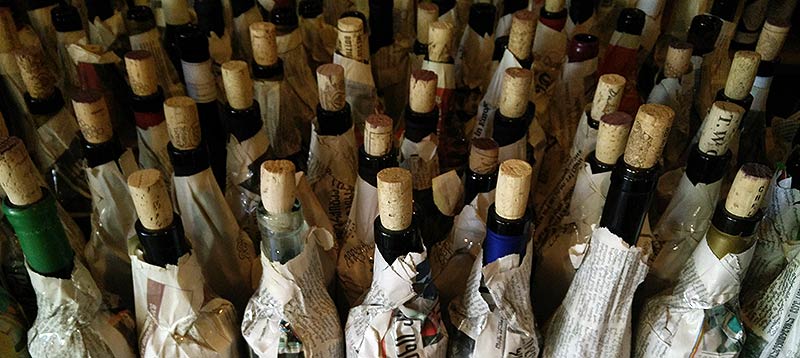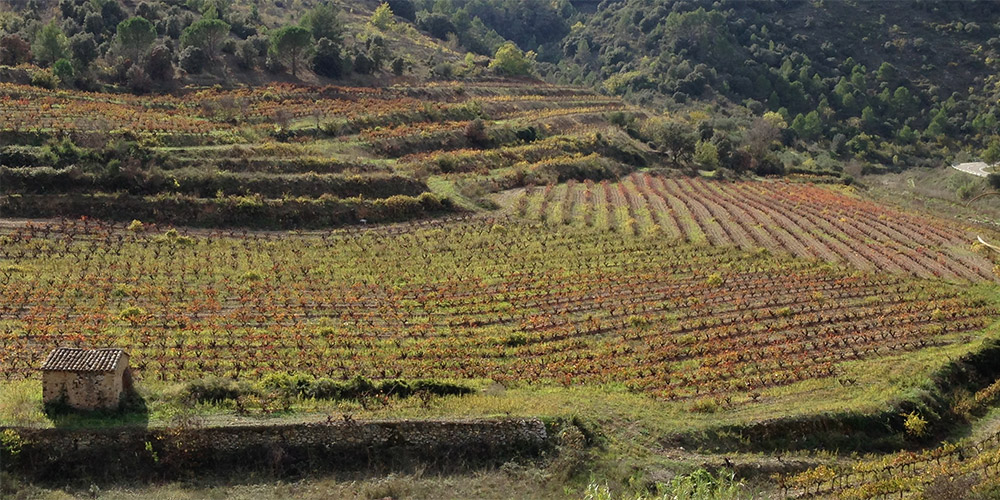Vinum is a wine shop in my adopted village of Porrera where it’s usually the mother of the family that owns it, Cori who you’ll find behind the counter. She’s from the next county over, which in villages means you might as well be from Mars but she’s integrated well into Priorat and I often find myself chatting with her as she’s a fount of local information and gossip.
On a recent morning she was in a mystified mood, “Miquel, I have no idea what happened but we’ve suddenly seen a boom, a literal boom in orders for the Clos Abella 2009. It’s long since sold out and now it’s only the 2012 available but people were very adamant about this specific year.”
As most either know or can surmise, a sudden, specific interest a specific wine usually means that some article came out praising a specific wine. The fact that this seems to have happened for a wine that’s no longer being stocked by this cellar called, Marco Abella, was a bit odd however.
In searching around, I quickly found that one of the local Catalan wine publications called, “Cupatges” had published an article two days previously about a review by Ed McCarthy on winereviewonline.com wherein he praises the wine heavily and awards it 100/100 points; apparently the first time he has ever given such a score.
The curious thing about this is that the article wasn’t news in the sense that it wasn’t new. It had been published nearly a year before it came out on this Catalan publication so I contacted the Editor-in-Chief, Ramon Roset to ask why they published it now? He responded that it was part of a recent press release by the winery. This isn’t surprising as this winery in question sends out items in press releases long after an event has happened for some reason but despite this, no one had heard mention of this until they sent this out.
So essentially, this article would have remained completely unknown to those in the region from where the wine originated as the article was in English. These silos that form between languages aren’t uncommon of course and wine isn’t the only sector to be affected by this. Wine has the advantage in that for better or worse, awarding wine points has done away with some of the issues of language as we can all understand numbers even if we can’t read the reasoning behind them. “Parker Points” seem to be as prevalent in Spain as they are in Hong Kong.
This one instance does show that, beyond the numbers, we’re missing out on a great deal about what’s being said in the world of wine. For myself and anyone else reading this we have an advantage as English speakers given that it’s gotten to be the main commerce language of wine and a great deal is written using this fine collusion of German and French. But, what are we missing in actual French, or Italian, or Chinese for that matter?
The last one is important given that we’re reminded time and again how much of a growing wine market China is. In China there is a magazine quite directly titled, “Wine in China” where this Clos Abella wine scored 97/100 points and in turn, was awarded “Best Wine in the World”–a loftier title I’ve not heard. Marco Abella sent out a press release about this immediately as no one would have heard about it given that the magazine awarding it is in Chinese. In notifying everyone in Spain about the award, they acted as a bridge.
This aspect of the bridge is quite crucial and ironically, you wouldn’t be reading an article about another article in Catalan that was about another article in English that was about an award in China had several “bridges” not come together to form a full link. While amusing, I find this all to be quite messy and redundant.
There seem to be few solutions to the issue at hand although some have leveraged it to their advantage. I have an acquaintance in Barcelona who has made what he considers to be a journalism career out of reading original articles in Spanish and then writing the same thing again for an English publication. While this may or may not be happening in wine (I’m simply not fluent in enough languages to know) we do see the same wines being reviewed multiple times for multiple markets for little reason than the fact we have no way to automatically bridge information about wine.
Some will say that we may arrive to a point where Artificial Intelligence will become the bridge between languages. Indeed, that handy “View Translation” link I see in Facebook is useful when both the Russian language and its alphabet fail me. The only issue is that wine is very specific in terminology and to match up terms requires a manual bridge, currently known as a “human being”.
By way of a simple example, “buttery” as a descriptor in English can’t be stated as “mantegós” in Catalan given that it sounds really strange when not talking about a croissant and you need to use “gliceric” instead but the catch is that this only works when talking about wine and currently, only a human can realize that.
While we can all find a common language in drinking wine, it seems that a lingua franca in talking about it is some ways off. Maybe some would say we’ve already arrived at this point, it’s English, everyone else just needs to realize it. Or maybe given the “solutionism” of Silicon Valley, someone could very well sink billions in to curing us of these language silo ills in wine instead of say, curing malaria.
But to come back around to this Clos Abella 2009, is this wine worth all the hype and international bridging of languages, reviews, and competitions? I leave you with the fact that Mr. McCarthy gave it 100 points, Wine in China gave it 97, Stephen Tanzer and Wine Enthusiast gave it 93, and at the Decanter Competition in 2013, it was awarded a Bronze or 86-89. Feel free to arrive at your own conclusions.



